The reasons why the UK has become an increasingly unequal society and what we could do to reverse this trend.
Author: Simon Duffy
This article is based on a talk given at York University. It addresses the question of why growing poverty and inequality has become an issue that the UK has persistently failed to address, under governments led by both main political parties. It argues that we must treat our growing tolerance for inequality not as a failure of policy, but as a constitutional failure, a side-effect of the corruption of the UK body politic.
Images, statistics and graphs referred to are from the slide presentation at the bottom of the page.
Inequality makes everything worse; but for some reason few people seem to care about it. This is the conundrum I want to explore:
Why is inequality invisible and what can we do to make it a live issue in the UK?
Inequality may be partly invisible because it is not itself a problem - it is just the major cause of so many other problems: poverty, homelessness, malnutrition, mental illness, stress, poor health, poor education, social fragmentation and even possibly, Brexit. It is tempting, especially for those who benefit from inequality, to argue that it is not inequality, but these other social problems that we must fix.
Obviously this is this a short-sighted policy, fostering the problems we say we want to resolve. But in fact, even worse than this, persistent inequality legitimises injustice and makes it much more likely that we won’t even tackle those problems at all. As our society becomes increasingly divided we are even more tempted to delude ourselves about our own generosity and sense of fair play.

Figure 1. Charity in action
In this picture, which I came across on Twitter, you can see our the three most common responses to any social problem:
If you remember the story of the Good Samaritan then it is uncomfortable to realise that, here in England, we often doing things much worse than passing by on the other side: today victims of social problems are typically bullied, sanctioned and see their plight turned into a business opportunity.
Technology may have made us richer, but it has certainly not made us better.
There are even those who will argue that inequality, while unfortunate, is a necessity, justified by the economic advantages that it supposedly brings - as if more money could make up for a broken spirit. But if this argument is ever true, which I doubt, it would only be true in a land with much higher levels of income equality than ours. We are nowhere near suffering from an excess of income equality.
In fact the UK provides good evidence of how inequality is bad for the economy.
Some still make economically illiterate statements like the 'UK is the 4th richest country in the world' ignoring the obvious fact that the UK’s wealth is distributed (unequally) across a relatively large population. A better working measure of a country’s economic wealth is per capita GDP, adjusted for purchasing parity - by that measure the UK is the 25th wealthiest country in the world.
Now there are some countries that are wealthier than the UK (like Kuwait and other oil-rich countries) who don’t publish their equality data. But most do, and when we compare the economic performance of countries who do publish equality data we find that every country in the world that is wealthier than the UK is also more equal than the UK, except for the USA and Singapore.
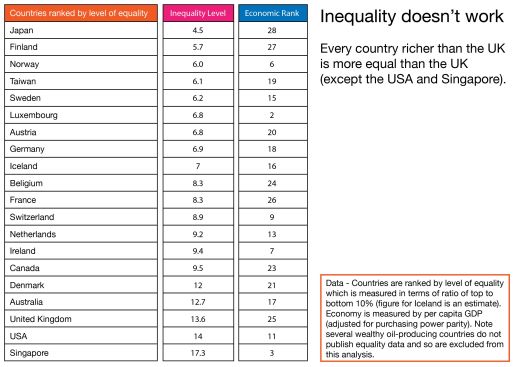
Figure 2. Wealth and inequality
Similarly, if we look at the UK’s economic performance over time then we find that there has been no improvement as inequality has increased, if anything our economic performance has declined.
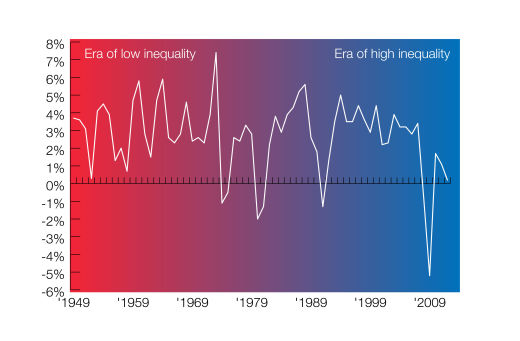
Figure 3. UK growth rate
Inequality may not, on its own, create wealth, but it certainly seems to help. More importantly, even if you only care about wealth, then a more equal distribution of wealth will increase your chance of enjoying that wealth.
We can see the economic problems created by inequality in a different way if we look inside any business or organisation that uses money to pay its staff. When we do that we find that inequality is inevitably inefficient.
One way to understand the extreme inefficiency of inequality is to picture the salary distribution of an organisation. In reality any such distributions would probably be on an exponential curve, but for simplicity’s sake we can use a trapezium to help us see what happens when we pay some people more than others.
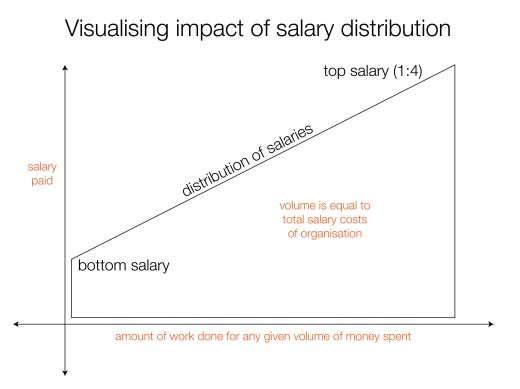
Figure 4. Salary distribution and efficiency rate
Along the x-axis we have the number of people employed, so the longer the x-axis the more work that can get done. Along the y-axis we have the salaries people receive. The volume of the trapezium represents the total salary bill of the organisation. Now, for any given salary bill, the most efficient use of that money is the most equal distribution of salaries:
To put this another way, if we paid a senior civil servant the same as a frontline worker then we would be able to employ 14 more people. If we paid them double, we’d still be able to employ 13 more and, and if their salary was triple the level of the frontline salary then we could still employ 12 more people and get much more work done.
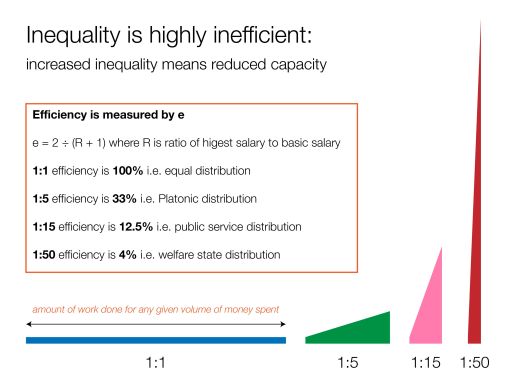
Figure 5. The inefficiency of inequality
Of course, it is also claimed we need income inequality in order to provide necessary work incentives:
However actual levels of inequality are completely disconnected from any putative incentive effect.
Can you name the line of highly paid work that is so intrinsically unattractive that you would need to pay people much more money than the average person in order to get people to do it? On the contrary, it is unattractive work that tends to be badly paid, and people still do this work so that they can try and escape the poverty and bullying of the benefit system.
And - if you do really want to be paid more - how much more is enough for you? Earning double what other people earn seems plenty to me, but we’ve seen the incomes of the richest 10% climb to 13 times more than the poorest 10% over the past 40 years - inequality has doubled - while society has become less productive.
Nor is it necessarily good that businesses are free to pay the most for key staff. This just means that some businesses can steal good staff away from other businesses. Look at the English Premier League for instance: nothing about this system really improves football - it simply concentrates the most money and the best players in a handful of clubs, mostly backed by oil-money.
The truth is you don’t even need to pay people more to do many of the jobs that attract the largest salaries: it’s great to be a footballer, to run the NHS, to be a film-star or to be an academic. These are all jobs that are intrinsically rewarding for anyone who has the necessary skills, interests and aptitudes. Often we are just paying people more to do a job that they love already and would do anyway.
Equality is a matter of discipline. People and groups in powerful positions may feel that this discipline is to their disadvantage. Manchester City FC have no desire to restrict the salaries of football players when they know that they can outbid any football team in the world. But such indiscipline and inequality is ultimately bad for the whole system. So the practical challenge is then largely about how those who benefit from equality can can organise themselves to restrict the influence of those who benefit from inequality.
It is important to recognise that inequality is not an economic necessity. Inequality is a choice.
Plato said the maximum difference between the rich and the poor should only be 5 times. So what justifies the difference between the CEO of the NHS, who earns £190,000 per year, a care assistant who might earn £14,000 (14:1) or someone on benefits might have an income of only £2,500 after tax (76:1)? These are public services where salaries, benefits and taxes are set by Government. There is no justification for such significant differences.
These inequalities are not the result of needing to incentivise people. These inequalities are not the result of market forces. These inequalities reflect the workings of power - both political and economic power.
Human difference is natural and it is a welcome feature of the world - without diversity the world would be stale and meaningless. But, while difference is natural and good - inequalities, particularly inequalities of power and money, are entirely man-made. (And gendered language does seem quite appropriate here.)
For instance, income inequality is primarily created by:
These all depend on unnatural, man-made systems and we decide how these systems work by the political and economic choices we make.
In the UK we have chosen, for over 40 years, to increase inequality. What is even more shocking is that, by a combination of economic and social policy the UK system has significantly reduced the incomes of the poorest 10% and redistributed those resources - not just to the the rich - but also to the middle.
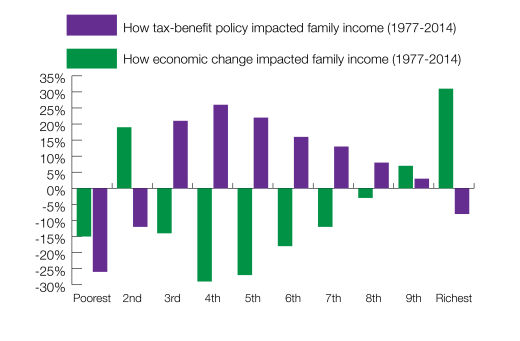
Figure 6. The manufacture of UK inequality
In fact things are even worse than this. Four decades of growing inequality has provided the perfect platform for the new era of austerity politics. The changes that were begun by the Coalition Government in 2010, and which have been continued by the two subsequent Conservative Governments, have seen even more extreme regressive policies: sanctions, food-banks, targeted cuts on disabled people and social care, cuts to legal aid and advocacy, even greater levels of privatisation and disregard for basic human rights. The Grenfell Tower disaster will be a symbol of this period of British history for decades to come.
So the question is not:
Why do we do nothing about poverty and inequality?
The real question is:
Why do we live in a society that insists on increasing poverty and inequality?
The challenge is to understand the forces at work in British society that are actively undermining social justice. Current policy is not an accident and the fact the UK is doing much worse than many other countries tells us that many of these issues are quite specific to the UK.
For something as unhealthy and undemocratic as severe inequality to persist and to grow then there must be something intrinsically wrong with the constitution of that society. I use the word constitution in its broadest sense to describe, not just constitutional law, but also the institutions of power and control within which which that law is situated. We can see this corruption play out in a number of different ways, for instance, if we adopt the 3-dimensional model of power proposed by Stephen Lukes, we can identify three different kinds of power:
In the UK today there is corruption at each of these three levels and this corruption works to undermine equality and to entrench advantage for elite groups.
There are at least two kinds of corruption that are possible in the process of democratic decision-making. The first kind of corruption is created when elite groups, detached from the wider interests of society, manage to gain undue influence over democratic decisions. The second kind of corruption is created when majority interests dominate minority interests. Strangely the UK is infected with both forms of democratic corruption.
We have a very powerful executive, a weak and unrepresentative Parliament and a second chamber that is worse than useless - effectively appointed by the ruling parties. The UK (particularly England) is hyper-centralised - with no effective counter-balance to central power at the local level and no protection for local democracy or local boundaries within the Westminster system. Our human rights, particularly our economic and social rights, are not effectively established in law, and so are typically ignored by policy-makers.
In addition the first-past-the-post voting system radically increases the influence of median-earners - the middle. Election results often depend on promoting the economic interests of middle earners, and as we have seen, it is often the poorest whose interests are then sacrificed. For instance, the ‘Benefit Thieves’ campaign, begun under Gordon Brown, pandered to middle-class prejudices about a non-existent problem - benefit fraud - while adding to a very real problem - the stigma of being poor. Likewise, when the financial crisis hit, the UK did not punish financiers or the politicians who had created the crisis, instead it reduced the cost of borrowing, reduced the cost of mortgages, pandering to homeowners, but actually redistributing billions towards the wealthy. So far this subsidy for homeowners has cost about £350 billion.
Effectively we have a nineteenth-century system of government, run by a small elite, supervising a welfare state that is supposed to protect all our interests. Elite interests dominate, but they find they are able to retain power by pandering to the interests and prejudices of middle-income groups.
A recent report from the Jospeh Rowntree Foundation suggests that we should resist the temptation to cynically believe the system is rigged. This is half right. The system is rigged, utterly and completely rigged, but cynicism has never advanced the cause of justice. Not just cynicism, but naïvety is also a major risk for anti-poverty campaigners. Everyone will say they are against poverty and inequality, but what we say and what we choose to do are often not the same thing at all.
Of course politics is not a world unto itself. Political life is situated within the wider framework of civil society and the operation of many groups who seek to advance the interests of their members, persuade the public and advance their conception of the good.
The UK prides itself on its rich civil society however the signs of corruption within civil society are clear. The weakened role of trade unions is an obvious problem, for there is strong evidence that higher levels of trade union power within a country significantly reduce inequality. But it is not just trade unions that have become weaker in recent decades.
Charities, who aim to protect the interests of social justice, are often taken, by the general public as the best advocates of the poorest. Yet austerity has revealed that they are now largely mute. Threatened by loss of funding, contractual obligations, lobbying legislation and the Charities Commission, few of the large national charities feel free to speak out publicly about injustices they will acknowledge in private. Many charities are now businesses, with well-paid CEOs and with contracts to protect. Unsurprisingly their interest often starts to focus on the ‘bottom-line’ rather justice itself.
Other institutions, like the Church and working mens clubs, which were once important in connecting and organising people at a local level, have also been in decline. Local government is supine, typically accepting whatever role is dictated to it by central government. Active civic engagement is not now natural and it is very difficult for families juggling multiple low paid jobs to become involved in self-advocacy.
It is not just the decline of the traditional voices for social justice that marks the corruption within civil society. The media, think tanks and even academia are increasingly funded and manipulated in order to advance narrow economic interests. For example, a US insurance company, Unum, has been working to undermine our social security system, for many years. Its only possible incentive is to open up the UK as a market for its disability and health insurance products and it has been very successful in persuading the UK Government to invent ‘welfare reforms’, like PIP and ESA, which weaken disability benefits and mire disabled people in conditionality regimes that only serve to undermine their mental health and increase the risk of suicide. When public policy is designed and funded by private interests then the chance of corruption is very high indeed.
Public conversations about the welfare state are now dominated by three toxic ideas:
While these ideas are somewhat contradictory, they are each useful in serving the interests of the powerful, and they each provide the setting for the corruption that prevails. Together they reinforce the sense that our problems are caused by the weak and that only the strong can save us.
It is noticeable how the tone of political discourse has coarsened over the past few decades. It is now possible for politicians to talk in the most demeaning terms about ordinary people and for this to be accepted. Alongside the obviously toxic scrounger-rhetoric there is an underlying habit of elitist thinking which is now so widespread it goes without comment. For example, take this quote from The Scotsman:
High-earning migrants and promising student entrepreneurs will find it easier to work in Britain as the coalition aims to ensure only “the right people are coming here”, the Immigration Minister has said. Damian Green, a Conservative MP, said middle managers, unskilled labourers and benefit seekers would be kept out as the coalition seeks only migrants who “add to the quality of life in Britain.”
Notice the way in which a statement about migration policy disguises profoundly elitist assumptions. According to this Conservative MP, until recently one of the most influential people in the UK Government: middle managers, labourers and people on benefits do not contribute to the quality of life in Britain. In other words, according to this Conservative, ordinary British people do not contribute to the quality of life in Britain.
The arrogance of this sentiment is astonishing if you think about it; but it’s now taken as a reasonable statement of policy by a leading newspaper.
The dominant values of our time, reflected and amplified through most of the mainstream media, are not democratic values. Instead we are living in an era of oligopolistic or aristocratic values. Society is to be measured by the standard of those who are wealthy, powerful or famous. If you are not succeeding by these standards then the fault lies in yourself, your genes, your habits and your lack of effort or moral fibre. Most of us can expect to have no more status than to be a small cog in the system: work, consume and make as little fuss as possible.
There are many theories about why these problems have got worse and they range from neoliberal conspiracy to the unpredicted consequences of wider economic and social changes. As with all human things, the chains of cause and effect are complex and if we simplify things too much then we will miss important threads.
However it is probably quite telling that these problems did get much worse from 1980s onwards. For this coincides with the collapse of communism and the effective end of any threat of internal social revolution within Western societies. At the beginning of the 21st century we have a tendency to forget how real this threat was felt to be in the post-war years. Politicians of the Right were generally willing, in the 1950s and 1960s, to make significant concessions to egalitarian sentiments when the threat of communist revolution felt real. Historically, social progress has always been closely connected to the ability of the poor to threaten the interests of the rich.
It is also noticeable that this decline in equality was much worse in English-speaking countries than in others. This suggests a mixture of constitutional and cultural factors. In particular, the US and the UK, two of the countries who suffer the most extreme levels of inequality, both have constitutions that tend to exaggerate the interests of the middle-earning groups, and both a very liable to financial corruption which tends to further increase the influence of the rich. In both countries the interests of the poor are effectively defended by no one.
There is also an important sense in which inequality begets inequality. Whatever the reason for its increase, once it has increased then the chances that it will sustain itself also increase: -
What is absolutely certain is that such inequalities do not go away on their own. It would be a mistake to think that the rich and powerful can simply be persuaded to give up their money and power. We would do better I think to remember the words of Aneurin Bevan:
“Politics is a blood sport.”
This does not mean we want blood to be spilled. But it is naïve to think that reform can be achieved without confronting the many interests that currently serve to undermine justice. Instead, if we accept that our problems are multi-layered and constitutional, then so must be our response. If so then three distinct strategies will be necessary:
We do not need to accept what others think. We can think for ourselves, we can read better books and we can organise our thinking around better ideas. Of course ideas are always mobile, flexible and debatable; but there are at least three critical ideas which we could advance to combat the current toxic cocktail.
Overall, what is missing from our public discourse is any sense of the value of ordinary people, of the value of difference, of the contributions we all can make to our society and the necessary civic ethos which should underpin a decent society. The great thing about a call to equality and justice is that - while it may threaten the most powerful - it benefits almost everyone else.
Justice will not be gifted from the powerful to powerless. Unless the powerless get organised and begin to challenge the interests of the powerful nothing will change. We can see signs of a growing wave of initiatives which signal a new approach, although it’s still early days:
What is critical about this new wave of civil society activity is the recognition that the voice of the poor and of the disadvantaged must itself become central. The influence of the old civil society organisations is waning because they have failed to properly enfranchise those they seek to represent. It is not surprising that trust in NGOs and charities has declined. Increasingly the general public are noticing that these organisations are really just businesses, with their own agendas.
To many people connecting the demand for equality to the demand for democratic and constitutional change will seem like folly. Each goal on its own seems quite hard enough, it is unrealistic to connect them.
However, throughout human history, the desire for new political settlements has always been closely linked to the desire to tackle social and economic injustices. Going back to ancient Athens, the birth of democracy was actually a response to extreme economic conflicts that were tearing Athenian society apart. Democracy was one part of a constitutional solution which aimed to restrict extreme inequality, end debt-slavery and restore social peace to Athenian society. This democratic revolution went onto to unleash one of the most creative societies in human history.
Moreover any radical reform that we might like to propose can always be undermined. Personally I believe universal basic income is the best foundation for a better system of income security; however unless this reform is underpinned by a better constitution then any such a reform could easily be undermined by the kind of extreme-Right-wing Government that we are currently enduring. Good policies are not good enough; implementation is critical and implementation is a function of our constitution.
However, constitutional reform, on its own, will simply not engage enough people to become achievable. Constitutional reform needs to be connected to the possibility of meaningful change in people’s lives. Even tackling poverty and inequality, expressed merely in those terms, is too abstract a goal to mobilise any real movement for social change. In contrast, one of the critical attractions of basic income is that it offers a universal reform, one that ends the stigma of the benefit system and benefits everyone.The campaign for a basic income offers people something that they can concretely imagine and get personally excited by. To fight poverty and inequality we need to be able to imagine the solid part of our community life that incorporates our goal.
Today the Centre for Welfare Reform, alongside a wide alliance or partners, is exploring how we might develop a movement for constitutional change, in order to protect our social and economic rights, protect our planet and encourage peace in the world. This will take time and a longer conversation, involving many different people, but I suspect we will want to explore: -
The UK has a tendency to muddle through, making minor incremental changes to its constitution. However it is now clear that the current constitution is not designed to protect the welfare state nor to sustain reasonable levels of income equality. Advocates of equality would do well to consider the constitutional underpinnings to any of their preferred policies and connect their efforts to these efforts.
Finally I’d like to point out how, if inequality can be engineered, then so can equality. Ultimately this is about redistribution, and even modest changes in the distribution of income would have a dramatic effect. For example, if we focus on just redistributing the excessive incomes of the top 10% then we can quickly increase equality and effectively eradicate poverty:
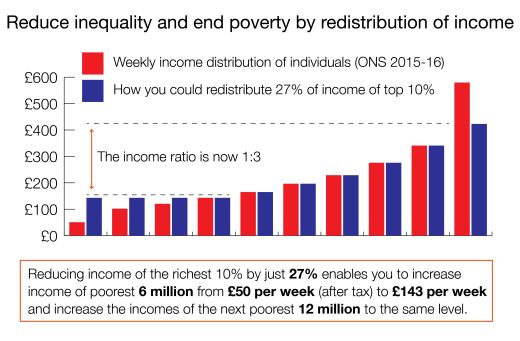
Figure 7. How to reduce inequality
Reducing the incomes of the richest 10% in this way still leaves them very wealthy and significantly more wealthy than those on lower incomes, but the benefits would be extraordinary. The UK would go from being a laggard to being a world leader in equality and many of the social problems we bemoan today would become a matter of history.
Martin Luther King once said:
“the arc of the moral universe is long, but it bends toward justice.
This feels true. But it also implies that justice can be absent for many lifetimes. To bend history towards justice is human work, our work and this work demands honesty, thought, strategy and real effort. That is our challenge.
The publisher is the Centre for Welfare Reform.
Inequality is a Constitutional Issue © Simon Duffy 2018
All Rights Reserved. No part of this paper may be reproduced in any form without permission from the publisher except for the quotation of brief passages in reviews.
Constitutional Reform, politics, England, Northern Ireland, Scotland, Wales, Article